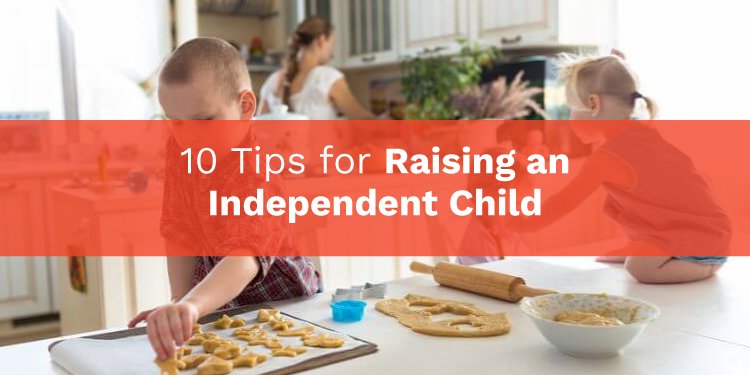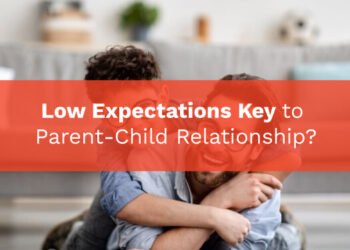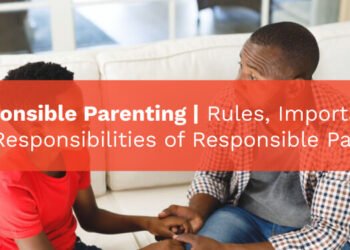Every parent wants to raise a responsible, independent, and happy child. But it is hard for children to comprehend the concept of responsibility and resilience.
As a parent, we get happy to see our children growing into adults but often tend to neglect children’s dependency. A good parent infuses the skills, knowledge, and interest to raise a responsible and independent child. It’s the responsibility of the parents to support their children on their journey toward independence and success.

If you’re a struggling parent reading this to raise an independent child, we have strategies that you can use to nurture confidence and independence in your children.
Here are 10 strategies for fostering independence and confidence in your child.
1. Assign responsibilities to your child.
Teach your kids to be responsible by assigning them household chores like doing dishes, taking out the trash, or any other small or big tasks.
Giving appropriate chores helps them face challenges, know the value of their hard work, feel a sense of accomplishment, know time management, learn valuable practical and life skills, and even helps to stimulate creativity in them.
Household chores will undoubtedly help them to understand that being responsible and accomplishing tasks will make them a successful person in life. However, you also have to teach them how to spend and save money.
2. Teach your child not to be dependent.
Dependent kids are more likely to be dull and demanding. Being a parent, you should encourage them to do their tasks like get themselves ready for school, pack their lunch and bags, fill up their bottles, etc., and not be dependent on you.
Don’t do everything for your children. Of course, as a parent, we want to lessen the burden and chores, but this dependency kills self-confidence.
Teaching your children to be dependent is to make your kids more responsible and autonomous. Try avoiding doing a small task your children can do on their own.
Do less and fewer things for them because skills will develop through doing.
3. Develop optimism
Optimism is an attitude or belief that the outcome of the task will always be positive, successful, and desirable. Having a positive attitude is one of the critical factors on the way to independence.
There is a saying that “Think positive, be positive and positive things will happen.” So, developing the feeling of optimism in children helps them to be more successful and happier people. It even reduces the harmful health effects.
In addition, being optimistic helps to bounce back from any failures and disappointments.
Firstly, you also need to be optimistic to foster optimism in your children. Even if your child fails in any of their endeavors, you should cultivate positive thoughts in kids that failure is the key to success. Encouraging kids to think positively and not quitting helps them in the long run. Teach your children to be positive towards every aspect of life.
4. Tell your kids that every practice was a learning process.
Practice makes a person perfect. Practice makes you confident and booming. Don’t make your child feel that a failure is a big mistake. Every child makes mistakes, but you should teach them how to overcome those failures or mistakes, get up, and fix that mistake.
Please don’t compare your child’s failure; instead, you should confront and encourage them to get better and excel next time.
Teach your kids to try hard until they succeed. Make them believe that practice makes you perfect. If children lose hope and give up and get judged for their failures, it affects their self-esteem and morality.
5. Don’t protect them too much.
It would be best if you were not too protective of your child. When a child learns to fight his own battle, he eventually becomes independent and self-reliant.
For instance, someone hits your son at school, you feel like rushing and warn that child. But, if you want an independent and responsible child, you need to develop the tolerance risk in your child for being scared, hurt, etc.
When they are defeated, frustrated, or in tears, it opens their mind and tries to find answers and fight their own battle. Let them fight, get hit, and make sure that they come back to you so you can give a little more information next time than before. Protecting too much also harms the ability and lowers the self-confidence of your child.
6. Build empathy towards your child.
A young kid is just learning how to be independent and responsible. As a parent, you should be able to comprehend your children’s feelings and emotions. You should show them how much you love and care for them and always encourage them to strive for the best no matter the failure.
Always be there to support him and avoid scolding and letting them down or judge them instead of motivating them to be better. To raise an independent child, you should be consistent and sensitive to their needs and desires and show how much you care and adore them.
7. Don’t take all the decisions for them.
Being a parent, you should give your child the space to learn, explore, ideate, and empathize with their own decisions and choices.
Parents think that their child often makes bad choices and decisions which they might regret later. So, they are continuously controlling the decision-making process of the child. Like, don’t order these clothes you’ll regret later, don’t hang out with them, don’t go outside late, it’s dangerous, etc.
You should comprehend that if you want your children to be more responsible and independent, you need to give them space and authority to make their own decisions and choices. Then, let them experience as experience teaches them to overcome the problems that make them successful and independent people in the long run.
As decision leads to independent thinking and confidence, always try to encourage your children to participate in any decision-making process of their lives. Then, when you make a decision-making environment in your family, they will be thinking for themselves and even help them improve decision-making in the long run.
8. Increase opportunities and teach to be self-reliant.
Self-reliance can be defined as the ability to do your work yourself and be confident in your abilities. Children are always looking for opportunities where they can grow and learn. So please don’t take away the chances where they can practice independence and responsibility.
If your child wants to learn something, then take your time to show them and encourage them to learn. Increase opportunities for your child to feel good about themselves and show them that they can contribute to your family. Like, if they want to help clean the kitchen, show and teach them how.
To teach children to be self-reliant, they have to develop emotional, interpersonal, and practical skills. Encouraging self-reliance is simply pushing independence in your child.
9. Encourage and praise your child
Encouraging and praising your children helps them to feel good about themselves and build self-confidence. It helps to replace unwanted behavior. Children are most likely to view challenging situations as permanent. It would be best if you boosted your children that every difficult situation is manageable and temporary.
The more you encourage your child, the more they will be effective in the decision-making process and be more confident and responsible.
When your child gives a good performance as he promised, don’t hesitate to encourage because this will boost his self-esteem and confidence. Encouraging and praising for the small or big tasks children have achieved helps to sow the seeds of independence in them.
10. Show them unconditional love and respect.
Love, respect, and patience help in shaping behavior and build confidence in children. If your child gets unconditional love and support from parents, they try to learn new skills and get motivated to explore different areas.
Children who get immense love, support, and respect from families are more likely to become confident, responsible, and strong-minded people. You can express your love by accepting your child, being grateful for their presence, listening to them, and spending quality time with them.
Yelling on children and judging them leads to a negative impact on their minds. Even though children don’t have too much practical knowledge, you can make them a part of family decisions to show them love and care. But, this activity makes them feel important and helps to improve their problem-solving and decision-making skills in the future.
Conclusion
Parenting is one of the most challenging yet overwhelming roles. Parents must accept equivalent accountability to raise an independent, confident, and responsible child. Independence is highly correlated with confidence and self-esteem.
As a parent, it is your responsibility to create an environment and opportunities that will nourish the independent thinking of your child. So I suggest you carefully pick the best suitable options to help raise an independent child.















